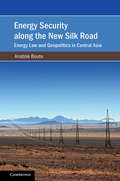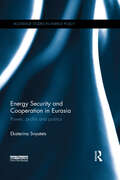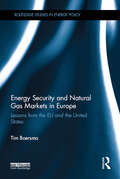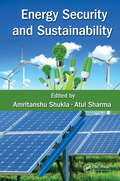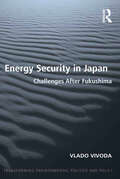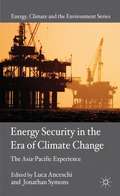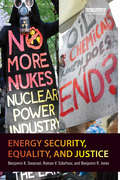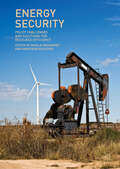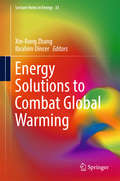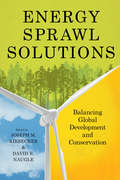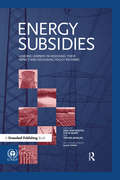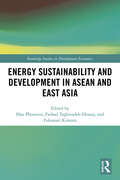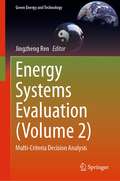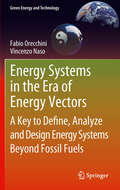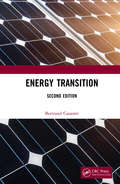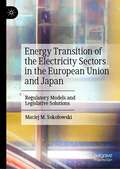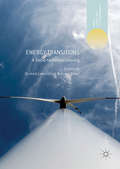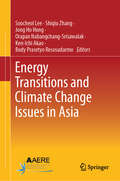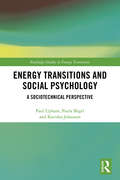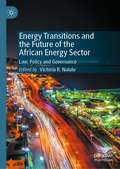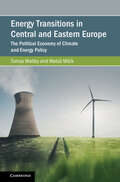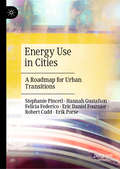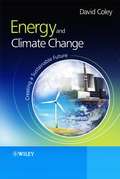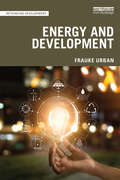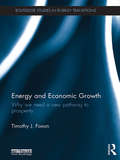- Table View
- List View
Energy Security along the New Silk Road: Energy Law and Geopolitics in Central Asia (Cambridge Studies on Environment, Energy and Natural Resources Governance)
by Anatole BouteGuaranteeing energy security is one of the most complex challenges of energy law and policy. Energy insecurity threatens economic development, social peace and stability. This book focuses on energy security in the strategically important region of Central Asia. The region holds huge energy reserves, but its energy systems are highly inefficient and unreliable, and thus require urgent reform. However, endemic corruption, discrimination and the strong centralization of power have so far blocked initiatives to reorganize energy supply. The case of Central Asia is uniquely relevant for understanding the informal constraints on energy law and policy. In addition, Central Asian energy insecurity illustrates the impact of geopolitics on the regulation of energy markets. The region is strategically located in Russia's sphere of influence and along China's New Silk Road. Its energy situation highlights the complex interactions amongst energy law, geopolitics and institutions.
Energy Security and Cooperation in Eurasia: Power, profits and politics (Routledge Studies in Energy Policy)
by Ekaterina SvyatetsWhy are bilateral relations, especially in the area of energy security, so different in the cases of U.S.-Russia, U.S.-Azerbaijan, and Russia-Germany energy deals? Why do some states find common ground despite differences, while others, with all the seemingly favourable conditions, are sinking into animosity? Energy Security and Cooperation in Eurasia explores varying outcomes of energy cooperation, defined as diplomatic relations, bilateral trade, and investment in oil and natural gas. The book looks at economic potential, geopolitical rivalry, and domestic interest groups in the cases of U.S.-Russia, U.S.-Azerbaijan, and Russia-Germany energy ties. It looks at major projects in each case (Sakhalin and Arctic oil and gas production, Baku-Tbilisi-Ceyhan and Nord Stream pipelines) and activities of international oil companies. The book also provides a detailed analysis of the situation in Ukraine since 2014 and Russia’s annexation of Crimea, and their effect on European energy security. This book utilizes an innovative approach of exploring the dyads of states (bilateral relations) along the economic, geopolitical, and domestic lobbying dimensions. This book is a valuable resource for graduate and undergraduate students, academics and researchers in the areas of Security, Political Economy, Comparative Politics, post-Soviet studies, as well as for general public.
Energy Security and Natural Gas Markets in Europe: Lessons from the EU and the United States (Routledge Studies in Energy Policy)
by Tim BoersmaMoving beyond most conventional thinking about energy security in Europe which revolves around stability of supplies and the reliability of suppliers, this book presents the history of European policy-making regarding energy resources, including recent controversies about shale gas and fracking. Using the United States as a benchmark, the author tests the hypothesis that EU energy security is at risk primarily because of a lack of market integration and cooperation between member states. This lack of integration still prohibits natural gas to flow freely throughout the continent, which makes parts of Europe vulnerable in case of supply disruptions. The book demonstrates that the EU gas market has been developing at different speeds, leaving the Northwest of the continent reasonably well integrated, with sufficient trade and liquidity and different supplies, whereas other parts are less developed. In these parts of Europe there is a structural lack of investments in infrastructure, interconnectors, reverse flow options and storage facilities. Thus, even though substantial progress has been made in parts of the EU, single source dependency often prevails, leaving the relevant member states vulnerable to market power abuse. Detailed comparisons are made of the situations in the Netherlands and Poland, and of energy policy in the USA. The book dismantles some of the existing assumptions about the concept of energy security, and touches upon the level of rhetoric that features in most energy security and policy debates in Europe.
Energy Security and Sustainability
by Atul Sharma Amritanshu ShuklaThere has been ever increasing interest in understanding the various aspects of available resources and production, in terms of need and supply, conservation and environmental impacts and so on. From the current energy scenario, it is very clear that there are serious challenges related in achieving energy sustainability and security worldwide. The aim of this book is to present an overview of progress made towards energy sustainability addressing concerns regarding carbon emission and clean energy resources. Keeping this in mind, the book has chapters on all major energy sources which are being utilized at present, along with those having potential prospects for future.
Energy Security in Japan: Challenges After Fukushima (Transforming Environmental Politics and Policy)
by Vlado VivodaFor a country already uneasy about energy security, the 2011 earthquake and tsunami, which caused a nuclear catastrophe at the Fukushima nuclear power plant, turned pre-existing Japanese concern about the availability of energy into outright anxiety. The subsequent closure of many nuclear reactors meant Japan needed to replace lost power quickly and so had no choice but to secure additional fossil fuels, undermining Japanese diversification policy and increasing global and regional competition for energy. This switch has been at a cost to the already weak Japanese economy whilst the increase in fossil fuel consumption has caused a significant increase in greenhouse gas emissions. In this book Vlado Vivoda examines the drastically changed environment following the disaster in order to analyse Japan’s energy security challenges and evaluate Tokyo’s energy policy options. Looking at how the disaster exacerbated Japan’s existing energy security challenges, Vivoda considers the best policy options for Japan to enhance national energy security in the future, exploring the main impediments to change and how they might be overcome.
Energy Security in the Era of Climate Change
by Jonathan Symons Luca AnceschiLeading scholars assess the transformations in energy security policy that flow from recognition of global climate change. They explore through case studies the key policy responses formulated in the Asia-Pacific and identify potential synergies between energy policy and climate mitigation efforts.
Energy Security, Equality and Justice
by Benjamin K. Sovacool Roman V. Sidortsov Benjamin R. JonesThis book applies concepts from ethics, justice, and political philosophy to five sets of contemporary energy problems cutting across time, economics, politics, geography, and technology. In doing so, the authors derive two key energy justice principles from modern theories of distributive justice, procedural justice, and cosmopolitan justice. The prohibitive principle states that "energy systems must be designed and constructed in such a way that they do not unduly interfere with the ability of people to acquire those basic goods to which they are justly entitled." The affirmative principle states that "if any of the basic goods to which people are justly entitled can only be secured by means of energy services, then in that case there is also a derivative entitlement to the energy services." In laying out and employing these principles, the book details a long list of current energy injustices ranging from human rights abuses and energy-related civil conflict to energy poverty and pervasive and growing negative externalities. The book illustrates the significance of energy justice by combining the most up-to-date data on global energy security and climate change, including case studies and examples from the electricity supply, transport, and heating and cooking sectors, with appraisals based on centuries of thought about the meaning of justice in social decisions.
Energy Security: Policy Challenges and Solutions for Resource Efficiency
by Nikolai Mouraviev Anastasia KoulouriThis book discusses energy policy within the framework of the expansion of renewable energy sources (RES) and increasing resource use efficiency. In this book, the term ‘resource efficiency’ is defined as deriving the most value from resource inputs related to energy production, while incorporating energy efficiency. The authors highlight the drivers, policy approaches, governance issues and management problems related to the reduction of dependency on fossil fuels by focusing on RES and resource efficiency. Mouraviev and Koulori argue that enhancing energy security requires a new approach, integrating two core components: the emphasis on increasing energy production from renewable sources and resource use efficiency, which forms a contrast to the traditional understanding of energy security as security of supply. Blending theory with practice using several case studies, this original book provides a novel conceptualisation of energy security that will be of interest and value to practitioners and policy makers as well as scholars and researchers.
Energy Solutions to Combat Global Warming
by Ibrahim Dincer Xinrong ZhangThis book gathers an in-depth collection of 45 selected papers presented at the Global Conference on Global Warming 2014 in Beijing, China, covering a broad variety of topics from the main principles of thermodynamics and their role in design, analysis, and the improvements in performance of energy systems to the potential impact of global warming on human health and wellbeing. Given energy production's role in contributing to global warming and climate change, this work provides solutions to global warming from the point of view of energy. Incorporating multi-disciplinary expertise and approaches, it provides a platform for the analysis of new developments in the area of global warming and climate change, as well as potential energy solutions including renewable energy, energy efficiency, energy storage, hydrogen production, CO2 capture and environmental impact assessment. The research and analysis presented herein will benefit international scientists, researchers, engineers, policymakers and all others with an interest in global warming and its potential solutions.
Energy Sprawl Solutions: Balancing Global Development and Conservation
by David E. Naugle Peter Kareiva Amal-Lee Amin Bruce A. Mckenney Christina M. Kennedy Daniela A. Miteva David Richard Cameron Eduardo Klein Gert Jan Kramer Graham Watkins Heather Tallis James Ross Oakleaf Jeff Opperman Jeffrey S. Evans John Randall Joseph Fargione Joseph M. Kiesecker Juan Carlos Gonzalez Tamayo Juan Jose Cardenas Lopez Juan Papadakis Kei Sochi Kevin E. Doherty Laura Crane Leandro Baumgarten Linda I. Krueger Mark Hebblewhite Peter Hawthorne Roger Eduardo Martinez Rivas Sharon Baruch-Mordo Sophie S. ParkerOver the next several decades, as human populations grow, the demand for energy will soar. But renewable energy sources have a large energy sprawl—the amount of land needed to produce energy—which can threaten biodiversity. In Energy Sprawl Solutions, scientists Joseph M. Kiesecker and David Naugle provide a roadmap for preserving biodiversity despite the threats of energy sprawl. Their strategy—development by design—identifies and sets aside land where biodiversity can thrive while consolidating development in areas with lower biodiversity value.This contributed volume features case studies from countries around the world, each describing a different energy sector and the way they have successfully maximized biodiversity protection. This book provides a needed guide for elected officials, industry representatives, NGOs and community groups who have a stake in sustainable energy-development planning.
Energy Subsidies: Lessons Learned in Assessing their Impact and Designing Policy Reforms
by Anja Von Moltke Klaus Töpfer Colin McKee Trevor MorganThe need to reform energy subsidies was one of the pressing issues highlighted at the World Summit on Sustainable Development. Many types of subsidy, especially those that encourage the production and use of fossil fuel, and other non-renewable forms of energy, are harmful to the environment. They can also have high financial and economic costs, and often only bring few benefits to the people for whom they are intended.Removing, reducing or restructuring such energy subsidies is helpful for the environment and the economy at the same time. Potential social costs in terms of employment in the conventional energy industry or reduced access to energy could be addressed by redirecting the money formerly spent on subsidies to income support, health, environment, education or regional development programmes.Of course, subsidies can have certain positive consequences, particularly where they are aimed at encouraging more sustainable energy production and use. Temporary support for renewable energy and energy-efficient technologies to overcome market barriers, and measures to improve poor or rural households' access to modern, commercial forms of energy, for instance, could be positive measures in support of sustainable development.Based on ground-breaking work undertaken by UNEP and the International Energy Agency, this book aims to raise awareness of the actual and potential impacts of energy subsidies and provide guidance to policy-makers on how to design and implement energy-subsidy reforms. It provides methodologies for analysing the impact of subsidies and their reform, and reviews experiences with energy subsidies in a number of countries and regions. Drawing on these case studies, it analyses the lessons learned as well as the policy implications, and provides guidance on how to overcome resistance to reform.The book provides an analytical framework which aims to set the scene for the detailed discussion of energy-subsidy issues at the country level. It considers how subsidies are defined, how they can be measured, how big they are and how their effects can be assessed. A more detailed discussion of methodological approaches to the assessment of the economic, environmental and social effects of subsidies and their reform is contained in the Annex.Chapters 3–11 of the book contain country case studies from contributing authors, which review various experiences and issues related to energy subsidies in selected countries, but do not strive for a common approach. They are organised along geographical lines, beginning with a review of energy subsidies generally in OECD countries. Case studies of energy subsidies in transition economies – the Czech and Slovak Republics (Chapter 4) and Russia (Chapter 5) – follow. Three studies of Asian countries focus on the costs of different types of energy subsidy: electricity subsidies in India (Chapter 6), oil subsidies in Indonesia (Chapter 7) and energy subsidies generally in Korea (Chapter 8). Chapter 9 reviews the effect of energy subsidies in Iran and suggests a pragmatic approach to reforming them. This is followed by an assessment of the LPG subsidy programme in Senegal (Chapter 10) and an analysis of the effects of removing coal and oil subsides in Chile (Chapter 11).Chapter 12 analyses the lessons learned from these case studies, focusing on the economic, environmental and social effects and their implications for policy. Finally, Chapter 13 discusses the implications of these findings and makes practical recommendations for designing and implementing policy reforms.This book will be essential for both practitioners and academics involved in the energy sector and for governments and policy-makers wishing to examine the reform of energy subsidies.
Energy Sustainability and Development in ASEAN and East Asia (Routledge Studies in Development Economics)
by Farhad Taghizadeh-Hesary Fukunari Kimura Phoumin HanThe rapid and sustained economic growth of the past two decades has led to marked increases in energy demand in the region and developing Asia will continue to lead the energy demand growth. The increase in energy demand threatens energy security and efforts to curb carbon dioxide emissions, affecting health and social well-being. These common energy challenges will need to be addressed through concerted efforts. This book provides several multi-dimensional quantitative analysis of the relationship between energy and other subjects including but not limited to income and economic growth, environment and health, food and agricultural production. The book also provides the most constructive policy recommendations concerning the relationship between energy, economic development, social development, and environmental development.
Energy Systems Evaluation: Multi-Criteria Decision Analysis (Green Energy and Technology)
by Jingzheng RenThis book presents various multi-criteria analysis methods for sustainability-oriented analysis and decision-making for energy systems, under various different conditions and scenarios. It presents methodologies to answer the questions relating to which of the options are the most sustainable among the alternatives, and how multi-criteria decision analysis methods can be used to select the most sustainable energy systems. A systematic innovative methodological framework is presented, which enables the most appropriate energy system to be selected under different conditions including: Scientific decision support tools for sustainable energy system selection; Fuzzy, grey, and rough sets based multi-criteria decision analysis; Decision-making models under uncertainties; and The combination of life cycle thinking and multi-criteria decision analysis This book is of interest to researchers, engineers, decision makers, and postgraduate students within the field of energy systems, sustainability, and multi-criteria decision analysis.
Energy Systems in the Era of Energy Vectors
by Vincenzo Naso Fabio OrecchiniWhat lies beyond the era of fossil fuels? While most answers focus on different primary energy resources, Energy Systems in the Era of Energy Vectors provides a completely new approach. Instead of providing a traditional consumption analysis of classical primary energy resources such as oil, coal, nuclear power and gas, Energy Systems in the Era of Energy Vectors describes and assesses energy technologies, markets and future strategies, focusing on their capacity to produce, exchange, and use energy vectors. Special attention is given to the renewable energy resources available in different areas of the world and made exploitable by the integration of energy vectors in the global energy system. Clear definitions of energy vectors and energy systems are used as the basis for a complete explanation and assessment of up-to-date, available technologies for energy resources, transport and storage systems, conversion and use. The energy vectors scheme allows the potential realization of a worldwide sustainable energy system to fulfill global development expectations by minimizing both the impact on the environment, and the international political frictions for access to limited and concentrated resources. Energy Systems in the Era of Energy Vectors is an informative read for researchers and advanced students in industrial, energy and environmental engineering. It also contains valuable information for managers and technicians working in the energy sector.
Energy Transition
by Bertrand CassoretThis book presents both the importance of energy transition and its associated difficulties. Energy Transition, Second Edition, provides an explanation of the physical concepts of energy and power and also reviews global energy consumption and our dependence on energy. The book discusses the links between the economy and energy. It explains the drawbacks and dangers of different energy sources and tries to compare them. By reviewing future energy resources, it evaluates several transition scenarios. The book shows that the laws of physics prevent the emergence of simple, pleasant solutions, but it proposes potential solutions and encourages readers to develop better processes from energy sources to production to consumption. This book will be of interest to engineers and undergraduate and graduate students studying and working in various fields of energy; producers of fossil, gas, oil, coal, electric, renewable, and nuclear energy; and anyone interested in better understanding these fundamental problems for our future. FEATURES Discusses the current issues with energy transition Covers several energy transition scenarios and their associated difficulties Presents the links between economy and energy Highlights the importance of a global discussion of energy Encourages the development of better, improved processes in energy sources from production to consumption
Energy Transition of the Electricity Sectors in the European Union and Japan: Regulatory Models and Legislative Solutions
by Maciej M. SokołowskiThis book provides a comprehensive overview of the energy policies in the European Union and Japan in terms of electricity markets and climate action, including energy efficiency, renewable energy sources, and the reduction of emissions. The book evaluates and compares the regulatory frameworks for achieving energy transitions by answering a number of questions focused on the essence and range of the regulatory models used by leading global economies which herald carbon neutrality by 2050. The book provides a useful framework that systematises Japanese and European energy policies and legislation including electricity-related policies, plans, and programmes. Discussing these issues in relation to the European and Japanese 2050 energy transition the author delves into the four pillars of the transition: market reform, reduction of emissions, promotion of renewables, and enhancing energy efficiency. Each chapter demonstrates the timing of the actions undertaken both in Europe and Japan; analyses the character of the conducted actions, evaluates the stakeholders of the realised agenda; and presents the technologies involved in the energy transition.
Energy Transitions
by Alain Nadaï Olivier LabussièreThis book elucidates what it means to transition to alternative sources of energy and discusses the potential for this energy transition to be a more democratic process. The book dynamically describes a recent sociotechnical study of a number of energy transitions occurring in several countries - France, Germany and Tunisia, and involving different energy technologies - including solar, on/off-shore wind, smart grids, biomass, low-energy buildings, and carbon capture and storage. Drawing on a pragmatist tradition of social inquiry, the authors examine the consequences of energy transition processes for the actors and entities that are affected by them, as well as the spaces for political participation they offer. This critical inquiry is organised according to foundational categories that have defined the energy transition - ‘renewable’ energy resources, markets, economic instruments, technological demonstration, spatiality (‘scale’) and temporality (‘horizon(s)’). Using a set of select case studies, this book systematically investigates the role these categories play in the current developments in energy transitions.
Energy Transitions and Climate Change Issues in Asia
by Soocheol Lee Ken-Ichi Akao Budy Prasetyo Resosudarmo Shiqiu Zhang Jong Ho Hong Orapan Nabangchang-SrisawalakThe rapid pace of economic development and urbanization in Asia have led to several major problems such as greenhouse gas emissions, mass consumption, and depletion of natural resources. These problems pose a major threat to a sustainable future for Asia and are hindering many Asian countries' goal of becoming carbon-neutral by the middle of this century. Solving these problems requires a comprehensive understanding of the nature of energy consumption, exploitation of natural resources, and deterioration of the environment.To accelerate the green energy transition and promote efficient resource use in Asia, a range of policy options and joint efforts among Asian countries will be required, including carbon pricing, resource tax reform, the expansion of transition finance, support for the development of low-carbon, and resource-efficient social infrastructure. However, Asia is home to many countries, each in a different stage of economic development and with its own culture and customs. Practical implementation of these policies will require bringing together researchers, policymakers, and citizens to share their knowledge and engage in discussions to generate policy ideas that are appropriate for each country. The purpose of this book is to share theoretical and empirical knowledge and convey policy implications that can be expected to accelerate energy transition and resource use effectiveness toward a sustainable future in Asia.
Energy Transitions and Social Psychology: A Sociotechnical Perspective (Routledge Studies in Energy Transitions)
by Paul Upham Paula Bögel Katinka JohansenThis book explains how social psychological concepts can be closely integrated with sociotechnical perspectives of energy transitions. It shows the value of actor-centred analysis that acknowledges the role of individual-level processes within their wider contexts of energy supply and use. In this way, the book connects social psychological and sociological frames of analysis, preserving the value of both, to provide multi-level, analytically extended accounts of energy transitions processes. Sociotechnical thinking is about the interactions of people and technology, including the rules, regulations and institutions involved. Such perspectives help to identify the many forms of path dependency that can make change difficult. Human behaviour plays a strong role in maintaining these path dependencies, but it can also introduce change. This book advocates a deliberately interdisciplinary research agenda that recognises the value of social psychological perspectives when seeking to create new pathways for energy supply and use. At the same time, it also demonstrates the value of sociotechnical perspectives for energy-related social psychology. Energy Transitions and Social Psychology will be of great interest to students and scholars of energy transitions, environmental and energy psychology, sustainable development and innovation studies, as well as students and scholars of environment and energy more generally.
Energy Transitions and the Future of the African Energy Sector: Law, Policy and Governance
by Victoria R. NaluleThis book explores current developments in the African energy sector and highlights how these are likely to be affected by the ongoing global efforts to transition to a low-carbon economy. It analyses the legal, regulatory and policy frameworks at the national and regional level as they relate to Energy transition in Africa and discusses how regionalism is increasingly utilized to tackle energy access and climate change challenges. Using case studies from across the continent, several key thematic issues, including gender justice, social license to operate, local content and conflict of energy laws are covered in detail. The authors also uniquely examine the progressive nature of global energy use and introduce the new concept of ‘Energy Progression.’ This book will be an invaluable reference for researchers and policymakers looking for a comprehensive overview of the field.
Energy Transitions in Central and Eastern Europe: The Political Economy of Climate and Energy Policy (Cambridge Studies on Environment, Energy and Natural Resources Governance)
by Tomas Maltby Matúš MišíkThis book examines the mutual interplay of climate and energy policies in eleven Central and Eastern European countries in the context of the EU's energy transition. Energy security has long been prioritised in the region and has shaped not only national climate and energy policy, but also EU-level policy-making and implementation. Whilst the region shares economic, institutional and historical energy supplier commonalities it is not homogenous, and the book considers the significant differences between the preferences and policies of these member states. Chapters also explore the effect of the EU on member states that have joined since 2004 and their influence on the EU's energy and climate policies and their role in highlighting the importance of the concepts of security and solidarity. The book highlights the challenges to, and drivers of, energy transitions in the region and compares these with those in global energy transitions.
Energy Use in Cities: A Roadmap for Urban Transitions
by Stephanie Pincetl Hannah Gustafson Felicia Federico Eric Daniel Fournier Robert Cudd Erik PorseIn an era of big data and smart cities, this book is an innovative and creative contribution to our understanding of urban energy use. Societies have basic data needs to develop an understanding of energy flows for planning energy sustainability. However, this data is often either not utilized or not available. Using California as an example, the book provides a roadmap for using data to reduce urban greenhouse gas emissions by targeting programs and initiatives that will successfully and parsimoniously improve building performance while taking into account issues of energy affordability. This first of its kind methodology maps high-detail building energy use to understand patterns of consumption across buildings, neighborhoods, and socioeconomic divisions in megacities. The book then details the steps required to replicate this methodology elsewhere, and shows the importance of openly-accessible building energy data for transitioning cities to meet the climate planning goals of the twenty-first century. It also explains why actual data, not modeled or sampled, is critical for accurate analysis and insights. Finally, it acknowledges the complex institutional context for this work and some of the obstacles – utility reluctance, public agency oversight, funding and path dependencies. This book will be of great value to scholars across the environmental sectors, but especially to those studying sustainable urban energy as well as practitioners and policy makers in these areas.
Energy and Climate Change
by David ColeyFor more information on this title, including student exercises, please visit , http://www.people.ex.ac.uk/DAColey/Energy and Climate Change: Creating a Sustainable Future provides an up-to-date introduction to the subject examining the relationship between energy and our global environment. The book covers the fundamentals of the subject, discussing what energy is, why it is important, as well as the detrimental effect on the environment following our use of energy. Energy is placed at the front of a discussion of geo-systems, living systems, technological development and the global environment, enabling the reader to develop a deeper understanding of magnitudes.Learning is re-enforced, and the relevance of the topic broadened, through the use of several conceptual veins running through the book. One of these is an attempt to demonstrate how systems are related to each other through energy and energy flows. Examples being wind-power, and bio-mass which are really solar power via another route; how the energy used to evaporate sea water must be related to the potential for hydropower; and where a volcano's energy really comes from.With fermi-like problems and student exercises incorporated throughout every chapter, this text provides the perfect companion to the growing number of students taking an interest in the subject.
Energy and Development (Rethinking Development)
by Frauke UrbanThis book explores the complex relationship between energy and development and discusses the core issues and concepts surrounding this growing area of research and policy. In the field of energy and development, the world faces two major challenges: (1) Providing energy access to the roughly one billion people worldwide who do not have access to electricity and the nearly three billion people worldwide who do not have access to clean cooking fuels; (2) achieving socioeconomic development while limiting global atmospheric temperature increases to 2 degrees Celsius to mitigate climate change. Taking stock of progress, Frauke Urban explores the key issues surrounding these goals and addresses the policy responses aimed at ending energy poverty and achieving sustainable development. She outlines various options for delivering energy access, analyses past and prospective energy transitions and examines the social, environmental, economic and technological implications of these possibilities. Taking a holistic and multi-disciplinary approach and containing useful teaching resources, Energy and Development provides a comprehensive overview of this complex field of study. This book will be a great resource for postgraduate and undergraduate students, scholars, practitioners and policymakers working in the fields of energy studies, international development, environmental studies, industrial engineering, as well as social sciences that relate to energy and development.
Energy and Economic Growth: Why we need a new pathway to prosperity (Routledge Studies in Energy Transitions)
by Timothy J. FoxonAccess to new sources of energy and their efficient conversion to provide useful work have been key drivers of economic growth since the industrial revolution. Western countries now need to transform their energy systems and move away from the single-minded pursuit of economic growth in order to reduce our carbon emissions, and to allow the environmental space for other countries to develop in a more sustainable way. Achieving this requires understanding of the dynamics of economic and industrial change with appreciation of the dependence of economies on ecological systems. Energy and Economic Growth thus examines the links between three issues: history of energy sources, technologies and uses; ecological challenges associated with the current dominant economic growth paradigm; and the future low carbon energy transition to mitigate human-induced climate change. Providing a historical understanding of the relevant connections between physical, social and economic changes, the book enables the reader to better understand the connection between their own energy use and global economic and environmental systems, and to be able to ask the right questions of our political and business leaders. This is a valuable resource for students, scholars and policy makers with an interest in energy, climate change and economic thinking.
